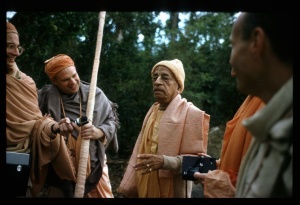CC Madhya 13.139 (1975): Difference between revisions
(Vanibot #0027: CCMirror - Mirror CC's 1996 edition to form a basis for 1975) |
(Vanibot #0020: VersionCompareLinker - added a link to the Version Compare feature) |
||
| Line 2: | Line 2: | ||
<div style="float:left">'''[[Sri Caitanya-caritamrta (1975)|Śrī Caitanya-caritāmṛta (1975)]] - [[CC Madhya (1975)|Madhya-līlā]] - [[CC Madhya 13 (1975)|Chapter 13: The Ecstatic Dancing of the Lord at Ratha-yātrā]]'''</div> | <div style="float:left">'''[[Sri Caitanya-caritamrta (1975)|Śrī Caitanya-caritāmṛta (1975)]] - [[CC Madhya (1975)|Madhya-līlā]] - [[CC Madhya 13 (1975)|Chapter 13: The Ecstatic Dancing of the Lord at Ratha-yātrā]]'''</div> | ||
<div style="float:right">[[File:Go-previous.png|link=CC Madhya 13.138 (1975)|Madhya-līlā 13.138]] '''[[CC Madhya 13.138 (1975)|Madhya-līlā 13.138]] - [[CC Madhya 13.140 (1975)|Madhya-līlā 13.140]]''' [[File:Go-next.png|link=CC Madhya 13.140 (1975)|Madhya-līlā 13.140]]</div> | <div style="float:right">[[File:Go-previous.png|link=CC Madhya 13.138 (1975)|Madhya-līlā 13.138]] '''[[CC Madhya 13.138 (1975)|Madhya-līlā 13.138]] - [[CC Madhya 13.140 (1975)|Madhya-līlā 13.140]]''' [[File:Go-next.png|link=CC Madhya 13.140 (1975)|Madhya-līlā 13.140]]</div> | ||
{{CompareVersions|CC|Madhya 13.139|CC 1975|CC 1996}} | |||
{{RandomImage}} | {{RandomImage}} | ||
==== TEXT 139 ==== | ==== TEXT 139 ==== | ||
<div class="verse"> | <div class="verse"> | ||
:pūrve uddhava-dvāre, | :pūrve uddhava-dvāre, ebe sākṣāt āmāre, | ||
:yoga-jñāne kahilā upāya | :yoga-jñāne kahilā upāya | ||
: | :tumi-vidagdha, kṛpāmaya, jānaha āmāra hṛdaya, | ||
:more aiche kahite nā yuyāya | :more aiche kahite nā yuyāya | ||
</div> | </div> | ||
| Line 20: | Line 19: | ||
<div class="synonyms"> | <div class="synonyms"> | ||
pūrve—previously; uddhava-dvāre—through Uddhava; ebe—now; sākṣāt—directly; āmāre—unto Me; yoga—mystic yogic meditation; jñāne—philosophical speculation; kahilā—You have said; upāya—the means; tumi—You; vidagdha—very humorous; kṛpā- | pūrve—previously; uddhava-dvāre—through Uddhava; ebe—now; sākṣāt—directly; āmāre—unto Me; yoga—mystic yogic meditation; jñāne—philosophical speculation; kahilā—You have said; upāya—the means; tumi—You; vidagdha—very humorous; kṛpā-maya—mercifu1; jānaha—You know; āmāra—My; hṛdaya—mind; more—unto Me; aiche—in that way; kahite—to speak; nā yuyāya—is not at all befitting. | ||
</div> | </div> | ||
| Line 27: | Line 26: | ||
<div class="translation"> | <div class="translation"> | ||
" 'My dear Kṛṣṇa, formerly, when You were staying in Mathurā, You sent Uddhava to teach Me speculative knowledge and mystic yoga. Now You Yourself are speaking the same thing, but My mind doesn't accept it. There is no place in My mind for jñāna-yoga or dhyāna-yoga. Although You know Me very well, You are still instructing Me in jñāna-yoga and dhyāna-yoga. It is not right for You to do so.' " | |||
</div> | </div> | ||
| Line 34: | Line 33: | ||
<div class="purport"> | <div class="purport"> | ||
</div> | </div> | ||
Latest revision as of 07:34, 27 January 2020

A.C. Bhaktivedanta Swami Prabhupada
TEXT 139
- pūrve uddhava-dvāre, ebe sākṣāt āmāre,
- yoga-jñāne kahilā upāya
- tumi-vidagdha, kṛpāmaya, jānaha āmāra hṛdaya,
- more aiche kahite nā yuyāya
SYNONYMS
pūrve—previously; uddhava-dvāre—through Uddhava; ebe—now; sākṣāt—directly; āmāre—unto Me; yoga—mystic yogic meditation; jñāne—philosophical speculation; kahilā—You have said; upāya—the means; tumi—You; vidagdha—very humorous; kṛpā-maya—mercifu1; jānaha—You know; āmāra—My; hṛdaya—mind; more—unto Me; aiche—in that way; kahite—to speak; nā yuyāya—is not at all befitting.
TRANSLATION
" 'My dear Kṛṣṇa, formerly, when You were staying in Mathurā, You sent Uddhava to teach Me speculative knowledge and mystic yoga. Now You Yourself are speaking the same thing, but My mind doesn't accept it. There is no place in My mind for jñāna-yoga or dhyāna-yoga. Although You know Me very well, You are still instructing Me in jñāna-yoga and dhyāna-yoga. It is not right for You to do so.' "
PURPORT